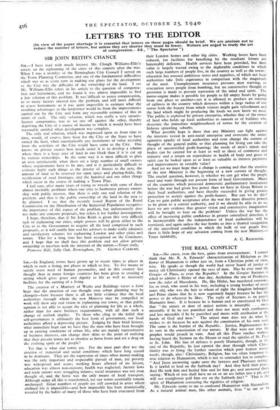Si,—In England, towns have grown up in recent times as
places in which to earn a living, not places in which to live. To live means to satisfy every need of human personality, and in this country less thought than in many foreign countries has been given to creating a' setting which gives grace and dignity to life as well as necessary facilities for the earning of a living.
The creation of a Ministry of Works and Buildings raises a faint hope that the direction of our thought over urban planning may be changed—faint because there is all too little evidence that the local authorities through whom the new Ministry may be compelled to work will show any real vision in replanning our towns, or that public opinion is yet able to accept the idea of planning for life as a whole, rather than for mere business requirements, with all that such a change of outlook implies. To those who 'cling to the belief that self-government is ultimately the best form of government, our local authorities afford a depressing picture. Judging by their brief history, what immediate hope can we have that the men who have been brought up in existing conditions of urban life, who are mainly representative of business interests, can change their skins to the point of realising that their present towns are as obsolete as horse buses and are a drag on the evolving spirit of the people) Yet that is what our towns are. For the most part they are the creation of industrial and social conditions which have long ceased to be dominant. They are the expression of times when money-making was the only important and respectable pursuit of Men, yet poverty was widespread and acute; working hours allowed of no leisure, education was almost non-existent; health was neglected; factory laws and trade unions were struggling infants; social insurance was not even thought of,. .and, the horse was the only means of local transport.
Although today all this is transformed, yet our towns essentially remain unchanged.- Great numbers of people are still crowded in areas where civilised life is impossible—and how impossible has been dramatically:, revealed by the habits of many of those who have been evacuated from
their London homes and other big cities. Working hours have been reduced, yet facilities for benefiting by the resultant leisure are lamentably deficient. Health services have been provided, but their value is largely wasted owing to the deplorable conditions in which such large numbers of people live, in the country as well as the towns: education has aroused ambitious tastes and appetites, of which our local authorities take little cognisance in comparison with the magnitude of the need. Unemployment insurance prevents men starving, as evacuation saves people from bombing, but no constructive thought or provision is made to prevent starvation of the mind and spirit. The motor-engine makes it possible for people to fill empty hours by going from one place to another—yet it is allowed to produce an outcrop of ugliness in the country which destroys within a large radius of our towns both the beauty from which visitors might gain refreshment and the land which might be producing the foods we now know we need. The public is exploited by private enterprise, whether that of the owner of land who holds up local authorities to ransom or of builders who desecrate the immediate neighbourhood of towns by the creation of hideous sprawling suburbs.
What possible hope is there that any Ministry can fight against the interests vested in anti-social enterprise and overcome the unim- aginative apathy of local authorities and even change the current of thought of the general public so that planning for living can take the place of uncontrolled profit-hunting; the needs of men's minds and bodies can be catered for at least as well as those of commerce and industry and a return on expenditure in health of body and grace of spirit can be looked upon as at least as valuable as interest payments and improvements in rateable value?
And yet we must hope that a change is coming and that the creation of the new Ministry is the beginning of a new current of thought. The crucial question, however, is whether we can get what the people need and want through our present form of local Government. Many of the countries which possessed democratic parliamentary institutions before the war had given less power than we have in Great Britain to their local authorities, and have thereby succeeded in giving greater protection to society against the profit-hunter. But can we do this? Can we gain public acceptance after the war for more directive powers to be given to a central authority, and if we should be able to do so, have we any evidence that greater vision and constructive imagination will be brought to bear on the problem? Unless the war has the effect of increasing public confidence in greater centralised direction, it is inconceivable that the independence of local authorities will be restricted, and again unless the war bombs us into a shamed recognition of the uncivilised condition in which the bulk of our people live,' there is little hope of any salvation coming from the new Ministry.— Yours faithfully,
A. C. RICHMOND.


























 Previous page
Previous page